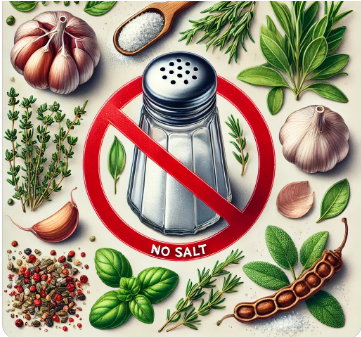Caring for your kidneys is super important, especially when it comes to what you eat. One big thing you have to watch is salt intake. High salt diets can be pretty harsh on your kidneys, making them work overtime to get rid of all that extra sodium. This can eventually lead to kidney damage or exacerbate existing conditions.
Salt is primarily composed of sodium chloride, but that’s not the only thing you have to look out for if you’re watching your kidney health. Phosphorus and potassium sneak into some salt substitutes too, and they can also be a problem if your kidneys are struggling to filter them out. So, understanding what’s in your salt and its alternatives is critical.
Now, I know going without salt can feel like you’re missing out on flavor. But luckily, there are salt substitutes out there that aren’t just for health nuts—they taste pretty good too! It’s about finding the right one that suits your taste while keeping your kidneys happy.
When you’re shopping for salt substitutes, skip right past those with high levels of sodium, phosphorus, or potassium unless your doctor says differently. This way, you can enjoy your meals without giving your kidneys any extra chores.
How Salt Substitutes Impact Kidney Health
Choosing the right salt substitute can make a real difference if you’re aiming to be kinder to your kidneys. The market offers both natural and chemically formulated options, each affecting your health differently.
Natural salt substitutes often include options like herbs and spices. These bad boys bring a flavorful punch without any of the sodium, phosphorus, or potassium drama, making them a great pick for those worried about kidney health. For those looking to jazz up their meals, something like garlic powder or a dash of lemon might fit the bill nicely.
Chemical salt substitutes are another story. Some get their kick from compounds that mimic the taste of salt but without the sodium. While they sound cool, they might still carry some drawbacks, especially if they’ve got hidden phosphorus or potassium, which can sneak up on you if you’re not careful.
Living with kidney issues already means you’re juggling diet challenges, and simplifying one aspect of it could be a huge win. Reduced sodium intake has been linked to lowering blood pressure and decreasing protein loss in urine, factors that benefit the kidneys in the long run. But, you’ve gotta strike that balance because the kidneys don’t like surprises.
Swapping regular salt for a substitute isn’t just about the health benefits—it’s about working something new into your meals that doesn’t leave you feeling deprived. Trying out new flavors can actually make the shift more fun.
Top 5 Kidney-Friendly Salt Substitutes
When you’re eyeing those salt shakers and thinking about a healthier swap, it’s time to explore some salt substitutes that keep the flavor while ditching the sodium, phosphorus, and potassium.
Herbs and spices top the list. Think basil, oregano, or rosemary. These guys are total flavor bombs and super versatile for whatever cuisine you’re into. Not only are they sodium-free, but they also come with added nutritional benefits like antioxidants.
Garlic powder is worth a mention. It’s the MVP for adding depth to your dishes. Unlike regular salt, it doesn’t increase blood pressure, so it’s a thumbs up for that kidney-friendly diet. Remem ber to use garlic powder not garlic salt.
Citrus zest or juice, like lemon or lime, can also transform a dish. The tanginess compensates for the missing salt, making food taste fresh and lively.
Vinegars, like balsamic or apple cider, are awesome for adding a complex, tangy depth that works great in marinades or dressings. They’re completely free of sodium and their tangy profile offers a new dimension to food.
How about black pepper or crushed red pepper flakes for some heat? They add that subtle kick without loading up on the things you don’t want. Plus, they can help enhance other flavors so you’re not missing the salt at all.
As a potential 6th salt substitute, some suggest tamarind as a salt substitute, because of its tangy, sour flavor. Its low in sodium and phosphorus, but rich in potassium. It also has anti-inflammatory attributes and antioxidants. If used in small amounts, it may be ok for kidney patients.
The trick with these substitutes is to experiment and find what leaves your taste buds—and your kidneys—happy.
Real World Benefits and Disadvantages of Each Substitute
Testing out salt substitutes is kind of like a taste adventure. The goal? Finding that balance where your meals are delicious and your kidneys are breathing easy.
Take herbs like oregano or basil. Flavor-wise, they’re awesome—they spice up pasta or pizza without the sodium. The downside? They won’t mimic the exact salty zing you might be hooked on.
Garlic powder is another gem. It’s rich and flavorful, making it a great addition to almost anything savory. Unlike salt, it won’t hike your blood pressure, but go overboard, and it can overpower other flavors. Mixed with some onion powder, it gives a deep flavorful blend.
Lemon or lime zest and juice transport dishes to citrusy heights. They’re fresh, vibrant, and sodium-free. However, not every dish pairs well with that tangy twist, so it’s a good idea to experiment first.
Vinegars like balsamic bring a richer tang that can elevate flavors without any sodium. However, they’re a bit much for folks who don’t dig that sharp taste, and sometimes, a little goes a long way.
Black pepper and red pepper flakes are heat seekers adding fire to the flavor chart without the hefty sodium. Yet, heat isn’t everyone’s thing, so you might want to ease into it if you’re sensitive to spicy foods.
In the grand panorama of flavors, each substitute carries its own pros and cons. Time to get hands-on and see what your taste buds rejoice for!
How to Find the Best Kidney-Friendly Salt Substitutes
Finding a kidney-friendly salt substitute that’s easy to search and fits your diet can seem like a hassle, but it doesn’t have to be. Think of it as a mission to stock that pantry with health-boosting and flavorful options that spark joy.
Keywords are your best buds in this hunt. Simple ones like “kidney-friendly salt substitute” or “low sodium seasoning” can help start the search. But long-tail keywords give you more tailored results. Try searching “best salt substitute for kidney disease” or “sodium-free spice blends.”
When rolling through search results, focus on keywords that mention benefits and effects, both health and flavor-wise. Keywords like “herbal salt alternatives” or “sodium-free seasoning for kidney diets” often lead to pages filled with helpful tips.
User reviews and community forums can also be goldmines for recommendations and real-life feedback. Words like “tasty salt alternative” paired with “kidney disease” might lead you to forums where other people, just like you, talk about their kitchen adventures.
Lastly, don’t overlook specialty sites and health blogs. They’re often up to date on trends and product reviews, helping you stay ahead of the curve without even breaking a sweat. Doing a bit of research pays off when it means healthier and tastier meals on the table.
Conclusion: Our Top Recommendation for a Kidney-Friendly Salt Substitute
Choosing the right salt substitute can be like finding the right outfit—it has to feel good and fit well. If you’re backing your kidneys while staying on flavor town, these swaps can do wonders. There’s one standout, though—herbs and garlic come together for a great mix that combines flavor and health benefits. They can mimic the saltiness and give your food a dimension without any unwanted sodium.
Garlic powder is a winner because it pairs effortlessly with numerous dishes and doesn’t overpower your plate’s delicate balance. Plus, its health benefits go beyond just low sodium, packing a punch with antioxidants and a rich taste that’s hard to beat.
Missing that tang? A splash of lemon juice or vinegar can provide that edge, especially when teamed up with herbs like basil or oregano. Each bite packs an unexpected zing, keeping your meals exciting and your kidneys unharmed.
These choices won’t leave you wandering around bland and confused on your favorite meals. Instead, they welcome you with open arms and flavors. Your experiences guide you, and each successful meal is a victory of taste and kidney health working together.
As you work these into your meals, keep things exciting by trying different herbs and vinegar combinations until you find what feels like magic in the kitchen. That’s where the fun starts without any of the risks.

